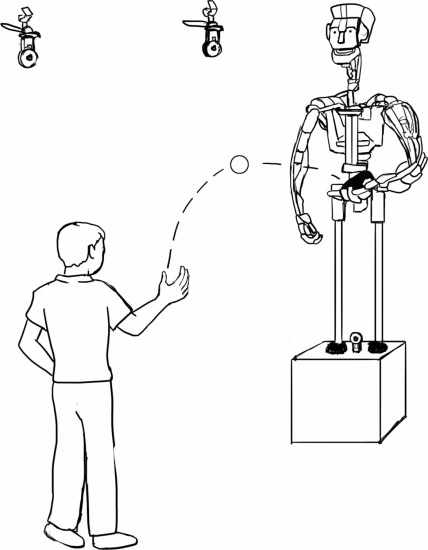Playing catch with robots: Incorporating social gestures into physical interactions
| Elizabeth Carter | Michael Mistry | G. Peter K. Carr | Brooke Kelly | Jessica Hodgins |
The 23rd IEEE International Symposium on Robot and Human Interactive Communication (October 20, 2014)

For compelling human-robot interaction, social gestures are widely believed to be important. This paper investigates the effects of adding gestures to a physical game between a human and a humanoid robot. Human participants repeatedly threw a ball to the robot, which attempted to catch it. If the catch was successful, the robot threw the ball back to the human. For half of the cases in which the catch was unsuccessful, the robot made a physical gesture, such as shrugging its shoulders, shaking its head, or throwing up its hands. In the other half of cases, no gestures were produced. We used questionnaires and smile detection to compare participants' feelings about the robot when it made gestures after failure versus when it did not. Participants smiled more and rated the robot as more engaging, responsive, and humanlike when it gestured. We conclude that social gesturing of a robot enhances physical interactions between humans and robots.
Elizabeth Carter, Michael Mistry, G. Peter K. Carr, Brooke Kelly, Jessica Hodgins (October 20, 2014). Playing catch with robots: Incorporating social gestures into physical interactions. The 23rd IEEE International Symposium on Robot and Human Interactive Communication.
@article{Hodgins:2017:DOE,
author={Elizabeth Carter, Michael Mistry, G. Peter K. Carr, Brooke Kelly, Jessica Hodgins},
title={Playing catch with robots: Incorporating social gestures into physical interactions},
journal={The 23rd IEEE International Symposium on Robot and Human Interactive Communication},
year={October 20, 2014},

